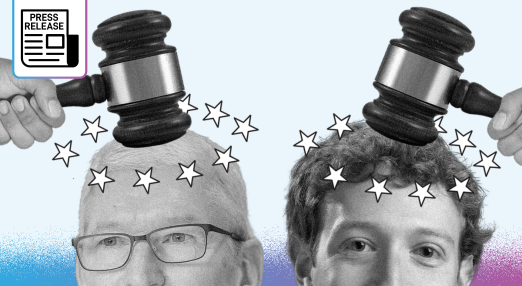Media relations
Have a question on European digital rights? Get in touch!
Our press releases
-

Press Release: Brussels rocked by major spyware scandal: Urgent call for ban
Now, when push has come to shove, policymakers at the European Union (EU) must act to ban spyware in Europe. Yesterday, the media reported a major attack on EU democracy with members of the European Parliament Defense Committee being the target of phone hacking.
Read more
-

EU AI Act: Deal reached, but too soon to celebrate
On 8 December 2023, following over 36 hours of negotiations, EU lawmakers finally cinched a deal on the Artificial Intelligence Act. However, whilst some fundamental rights protections have been won, the overall Act has not lived up to its potential to put people and their rights front and center.
Read more
-

A coalition of six organisations takes EU’s dangerous terrorist content regulation to court
On 8 November 2023, a coalition of six organisations filed a complaint before the French supreme administrative court, the Conseil d’État, against the French decree implementing the Regulation on addressing the dissemination of terrorist content online.
Read more
Our press mentions
-

Why the EU’s GDPR ‘simplification’ reforms could unravel hard-won protections
Since it came into force almost seven years ago, the European Union (EU)'s General Data Protection Regulation (GDPR) has set the global standard for data protection. It empowers people to control their personal data while holding businesses accountable for how they collect, process, and store that data. One would imagine that all of the above would cement the GDPR, but this crucial law is being threatened by a push for profit at any cost.
Read more
-

Commission slams Apple and Meta for breaching the Digital Markets Act, doesn’t stick the landing with fines
The European Commission has shown some teeth with the EU’s digital rulebook by slamming tech giants Apple and Meta with fines, and an order to stop the infringing behaviour. While we commend the strong stance, we're concerned about whether the low fines will actually lead to change of behaviour from the tech giants.
Read more
-

When data never dies: How better GDPR enforcement could minimise hate and harm
Lax enforcement of the GDPR has had far-reaching consequences for many people and collectives in the EU, especially those most vulnerable. Through a story based on real life experiences of people, this blog highlights the gap between the GDPR’s promise of protection and its current reality of weak enforcement, and the opportunity EU lawmakers have with the ongoing GDPR Procedural Regulations to take bold steps to protect our data rights.
Read more
